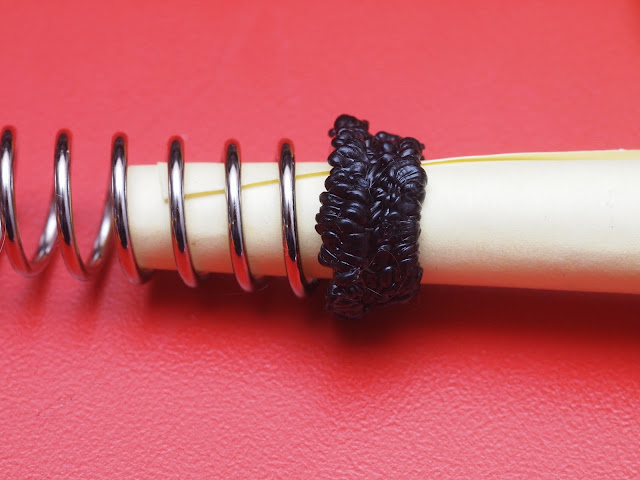It's a nice way to unwind, and leave any workstress behind. I'm sure some view an actual firing range as perfect for this - but for me, knocking over empty Poland Springs water bottles in the comfort of my living room is perfect 😁. That's really all I'm doing - knocking over a row of water bottles.
There's various types of mechanisms for launching darts. Spring based blasters force a piston down a tube compressing air quickly forcing a dart from a barrel. Flywheel based blasters use two spinning flywheels to project a dart. Air blasters build up air in a chamber, usually by pumping - and then eject the air all at once.
I started with buying a few spring based blasters. There's no spinup time like electric blasters, and while compressed air blasters are the most powerful, I haven't seen that many. They're there, but really require modding to bring out their full potential.
One of the first blasters I went for was the above hammershot. Painted it, changed the spring, added a spacer for tension, sealed the plunger tube spaces better. A little tape for a tighter o-ring fit, and alternate 7 shot brass barrel from ebay. For comfort, I added the tennis racket handle wrap. Nice one handed blaster - but not quite powerful to really aim accurately.
The spacer keep the spring under more tension, meaning more force and faster compression in the plunger tube. The roll of paper keeps the spacer hollow for the orange guide rod to pass.
While I was very pleased with the handling and look of the hammershot,I wasn't content with the performance. I also think that with a stronger spring than I was already using I'd break it. I picked up a cycloneshock next. The cycloneshock is another revolver but uses larger darts. By using a barrel mod, It fires the regular sized darts much much harder than other blasters. an extra spring at the back from another blaster and you're getting.
From searching forums, one of the weakpoints of the cycloneshock is the plunger rod where the springs push against. 3D pen to the rescue. Some grinding later and it fits perfectly while keeping the rod from bending.
After modding these of course I had to try building my own.
Turns out pneumatics are really interesting. Compressed air can do so much. Here's the gist. Using a pump - like a bike pump, to send air through one type of valve - a Quick Exhaust Valve, the air gets stored in a "tank". When ready to fire, lowering the pressure on the side of the QEV where it's getting pumped causes all the air to rush out from the tank. It's more efficient than using a regular switch, since as the switch is opening, the rate of exhaust starts slow. With the QEV, the air flow hits maximum almost immediately.
The basics of the QEV can be seen below.
Putting this into practice isn't quite as hard as you may think. I definitely overbuilt my first blaster, with too large a tank, too high a pressure potential, and too much space between the release valve and QEV. The release valve does "waste" a little air to create the low pressure for the QEV - but it's miniscule in proportion to the air in the tank - it's the air between the pump and QEV that will rush out. In my build I redirect it to the back of the barrel - bit pointless since it's not going to add any extra performance really.
How hard can this overbuilt steampunkish blaster hit?
Really. Freaking. Hard.
Next up - make a spring based blaster and another air powered one that's more comfortable and practical. Perhaps design a barrel that can take a standard nerf magazine for reloading...






